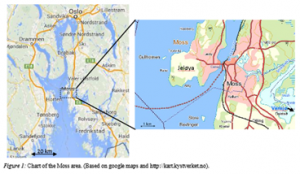Local ocean weather knowledge
Extraction and application for validation
MASTER THESIS, May, 2014
By Matthias Müller
Buskerud and Vestfold University College, Faculty of Technology and Maritime Sciences
 Inclusion of local knowledge is a novel approach for numerical model validation. This thesis examines how numerical model results can be compared with local knowledge. Professional sailors and people in leisure activity explained their experiences in semi-structured interviews. This knowledge has been prepared for validation with available and future numerical models. Several phenomena have been extracted and three of them have been applied for comparison against the computed current motion from the ROMS75 model. Wind and waves are not validated with the numerical model, since the applied model plots solely current motion and the water level. Wind and waves are however included in this paper, because they are part of the complex ocean mechanisms and indicate the reliability of local knowledge. The results of this thesis indicate consistency between the applied phenomena and the current numerical model. The applicability of local knowledge for numerical model validation therefore seems possible. Future research should increase the size of samples and volume of phenomena to strengthen this conclusion.
Inclusion of local knowledge is a novel approach for numerical model validation. This thesis examines how numerical model results can be compared with local knowledge. Professional sailors and people in leisure activity explained their experiences in semi-structured interviews. This knowledge has been prepared for validation with available and future numerical models. Several phenomena have been extracted and three of them have been applied for comparison against the computed current motion from the ROMS75 model. Wind and waves are not validated with the numerical model, since the applied model plots solely current motion and the water level. Wind and waves are however included in this paper, because they are part of the complex ocean mechanisms and indicate the reliability of local knowledge. The results of this thesis indicate consistency between the applied phenomena and the current numerical model. The applicability of local knowledge for numerical model validation therefore seems possible. Future research should increase the size of samples and volume of phenomena to strengthen this conclusion.
This paper includes three research questions:
- To what extent do the ocean weather conditions from the existing model comply with the experience from local people?
- How to generate reliable data and valid conclusions that can support the results from the computer model?
- How to compare experience from local people with results from numerical models?
The data from local people requires a selection process under consideration of the large variety of responses. The reduced data must have similar characteristics as the established knowledge to enable the examination. This thesis applies different tactics in charts and matrices to compare the data sets.
The model validation process focusses on ocean currents. Data from wind, waves, and the water level is valuable because of their interdependency in the oceanographic mechanisms. The currents are dominantly influenced by tide, winds, freshwater supply, and atmospheric pressure. Their respective influence varies in time and place.
Conclusion
This paper examined local ocean weather knowledge and applied three extracted phenomena for validation with one current FjordOs model. The validation results indicate the quality and capacity of this ocean current model. The paper describes a method which allows the generation of reliable data from local ocean weather knowledge. The validation of data with heterogeneous characteristics has been enabled by essential data selection and reduction.
The analysis of the graphical illustrated results revealed,that one phenomenon from local knowledge is consistent with the results of the numerical model. One validation result is ambiguous. The described phenomenon coincides with the results of the applied model during low and incoming tide, but not during high and outgoing tide. The third phenomenon is supported by the numerical model during outgoing tide, whereas not during high, low, and incoming tide. These validation results allow the conclusion, that comparison of these heterogeneous types of data is possible. The extent of consistency between the applied model and the extracted local knowledge indicates conformity.
This model validation increases the reliability of the preliminary model results and can be used to adjust the foci of other available and future numerical models from FjordOs. The local knowledge and validation results could also assist in the ongoing Moss harbour planning process. The port authority can use the phenomena for valuable insights of local people in the Moss ocean weather conditions.
Les rapporten: «Master thesis Matthias Mueller«
Se presentasjon: «Local ocean weather knowledge«
